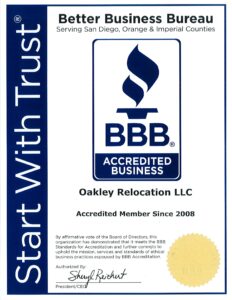Common issues with brokers include:
Scams –The amount of people who moved in 2020 has exploded – up 4% versus 2019 according to USPS change-of-address requests. This shift has unfortunately ushered in a new era of moving broker scams, which have become a growing problem. Posing as established moving brokers, scammers develop sophisticated websites and author seemingly credible business reviews that tend to pass the “sniff test” upon first impression.
Lack of Liability –Brokers simply delegate or outsource the moving service and are not responsible for the move itself. Once their service is complete, that’s where it ends. Because the truck, movers, and moving equipment are not held or facilitated by the broker, they are not held accountable for any damage doneto personal property as a result of human error or faulty equipment.
Multiple Points of Contact –It’s not uncommon for moving brokers to take a backseat once they collect their fee. If something goes astray, who is the customer supposed to contact, the moving company or the broker? More times than not, this ends up in a finger-pointing game with little to no resolution.
Price Transparency –A common tactic deployed by moving brokers is the bait-and-switch. Brokers frequently sandbag the quotes they submit to moving companies by underrepresenting the size of the move to close the deal and quickly collect their fee. To many mover’s surprise, once moving day comes, they are forced to unpack their wallet and pay a higher price than what the moving broker had quoted.
It’s important to weigh the risks of working with a moving broker. The moving party must ask themselves if a moving broker is the right choice, or if working with a full-service moving company is the way to go.
Cons
- Mispriced Quotes – It’s very common for brokers to lowball the price of the move, with the customer typically forced to pay more when the moving team arrives on move day.
- Lack of Accountability & Trust – If goods are lost, stolen, or damaged, no one is technically held responsible.
- Scams – Due to the rising demand for movers, moving scams are more common now more than ever.
- Larger Deposits – It is standard for large deposits to be required when customers work with a broker.
- Lack of Communication – Because brokers are third parties, your primary contact point isn’t with the actual moving company. This complicates the move and adds a layer of uncertainty.
Pros
- Slightly Less Expensive – If the quote is too good to be true, it is. Many families report being taken advantage of by movers when they align with a moving broker, with the moving team demanding more money on move day.
Moving Broker Risk vs. Reward
Working with a moving broker carries a high level of risk. If safety, transparency and integrity are high priorities, selecting a full service moving company like Oakley Relocation is the solution.
Our professional company has the quality scores, expertise, resources and licenses required to handle any type of move. Customers relocating depend on our knowledge to ensure that their goods are packed and moved properly so that they arrive in the same condition they left.
To help protect our customers, we recommend that before signing the pre-move paperwork, research the carrier and read all of their reviews. To simplify the process, Request a Free Quote from an accredited and licensed moving partner, such as Oakley Relocation. We are a professional organization recognized and trusted by the Better Business Bureau since our founding in 2008.







